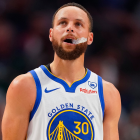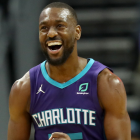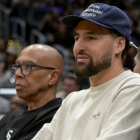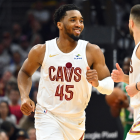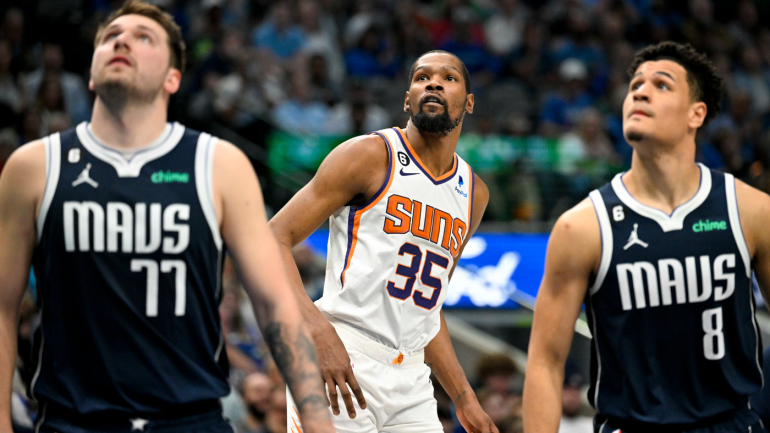
Luck.
Pure, absolute, roll-those-dice luck.
That's the dirty word floating around the NBA, where competitive players, proud general managers and hard-working scouts are bristling against the idea the league can be shaped by anything other than a talent-fueled meritocracy in which the best -- the best front offices, the best decision makers, the best players -- win because they earned it.
"There's certainly some luck that goes into it, but I like to think there's more skill," one top executive told CBS Sports.
He's not alone. Competitive people like to feel in control of their destinies. It's uncomfortable, if you spend your life chasing greatness, to contemplate the possibility that much of your life's mission might just come down to chance.
But despite the obvious fact that talent, hard work and drive are key, this season is shaping up as one that will be uniquely forged by forces beyond the control of players and front offices who are used to the idea that they, not fate, decide what happens on the court.
Still, in conversations, and with some prodding, there's a begrudging acknowledgment that as parity spreads across the league, the margins between postseason greatness and postseason goodbyes inevitably shrink.
The days of a couple of teams each season being ear-marked for a Finals appearance seem over.
Three teams (the Lakers, Spurs and Warriors) have represented the Western Conference in 20 of the past 24 NBA Finals. One player (LeBron James) alone notched eight straight Finals appearances out of the Eastern Conference from 2011-2018.
But despite the Warriors' title run last season, that sense of certainty is changing. There are a lot of reasons for what appears to be the beginning of an era of NBA parity: LeBron has gotten older, and therefore less dangerous. Same -- probably, maybe -- for the Warriors. Players like Giannis Antetokounmpo, Nikola Jokic, Joel Embiid, Jayson Tatum, Luka Doncic and Ja Morant have emerged.
The NBA's collective bargaining agreement has finally, to a degree, empowered smaller markets to retain stars and build contenders.
And of course the super-team trend means those lucky dice can seem to land one day on the Nets, and the next the Suns or Mavericks.
What does seem certain is that as the basketball bell curve flattens, more unpredictable variables -- like good and bad fortune -- may shift things significantly
Then, an injury might have cleared the way for one or two teams.
Now, a stroke of good or bad fortune could open the road for many.
Most around the league, in private, would tell you Boston, Milwaukee and Phoenix were a class to themselves. The Warriors were a dangerous question mark, the Lakers similarly if less threateningly so. Some made cases of varying degrees for the Sixers and Cavs in the East and the Nuggets and Grizzlies in the West.
After that, there was real disagreement on what to make of an array of teams: The Clippers, Kings, Mavs, Heat and Knicks.
But each day has seemed to bring some abrupt change in the NBA's view of itself.
Consider a quick look at injured players for teams that were, or are, supposed contenders at some point this season: Zion. Durant. LeBron. For a moment, it seemed a couple days ago before an MRI came back negative, Luka would join that list. A.D., Steph, Kawhi and P.G. earlier this season. Role players like Memphis' Brandon Clarke and Boston's Grant Williams.
And then there are the curious cases of Ja Morant this month, and Kyrie Irving earlier this season -- two talented players who, for vastly different reasons, went from keystones of championship containers to consequential question marks.
Morant's situation is troubling for obvious reasons beyond basketball. Irving's status was about a person's choices -- and one ugly burst of antisemitism. But in both cases, you can imagine team officials privately bemoaning, Why us?
Durant's slip during Thursday's pregame warmups for his home debut in Phoenix slammed this point home: In the NBA, teams make plans and God laughs.
Maybe Durant will be OK, but Greg Moore of the Arizona Republic reported that Suns officials fear Durant could miss the rest of the regular season. That, to say the least, is not good news. Later reports, confirmed by CBS Sports, said Durant will be re-evaluated in two weeks.
The Grizzlies, too, seem cursed. On top of Morant's self-imposed mess, bad news seems to keep on coming. Dillon Brooks got a short suspension. On Thursday, Steven Adams was ruled out for at least four weeks.
And before any of that, just before the Morant mess unfolded, the Grizzlies announced Clarke will miss significant time with an Achilles tear -- its own very impactful, if less headline-grabbing, turn of events.
That no-good-very-bad week for Memphis touches on other teams this season that have seen things sour suddenly.
The Pelicans went from top of the Western Conference contenders two months ago to an afterthought. Zion Williamson's continued fragility plays a key role in that.
The Lakers believed, truly, they'd managed the trade deadline with enough aplomb to possibly turn things around. Then, LeBron got hurt.
In February, the Warriors wanted to get into a real groove -- including to push back against the team's weird road-game incompetence -- only to see Curry go down for the second time this season. He just returned last Sunday after missing 11 games.
Yes, luck has always mattered. Durant and Klay Thompson getting hurt during the 2019 NBA Finals were surely helpful in the Raptors' (well-earned) title win. In 2013, the Spurs saw a bad bounce off a rebound end up in Ray Allen's hands -- and a series shift. That same Heat team was great its first year, but there are still some who will tell you Rajon Rondo's dislocated elbow was key in who made that NBA Finals. And so on.
Back when fewer teams had a real chance to make a deep run, an injury here or there -- or a ball bouncing one way or another, or a call going this way or not -- might just shift the timeline from one team to another. Now it feels like enough teams are in the mix, and enough impactful players keep getting hurt, that luck will play a particularly key component in this year's playoffs.
"I hate it," one executive who's won an NBA championship said. "But I can walk you through so many times little things you can't control mattered. That's even more true today."










